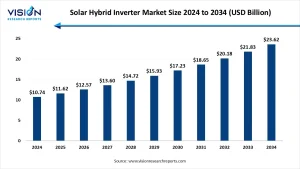The global solar hybrid inverter market size was estimated at USD 10.74 billion in 2024 and is expected to hit around USD 23.62 billion by 2034, growing at a CAGR of 8.20% from 2025 to 2034.
Get a Sample@https://www.visionresearchreports.com/report/sample/41689
Solar Hybrid Inverter Market Overview
The global solar hybrid inverter market is rapidly gaining momentum as the transition to renewable energy accelerates worldwide. These inverters, which integrate solar energy with other power sources such as the grid or battery storage, offer enhanced efficiency, reliability, and energy management. Their ability to optimize power flow and support both off-grid and on-grid applications makes them a vital component in the evolving energy landscape.
Solar Hybrid Inverter Market Growth
The increasing global demand for sustainable and uninterrupted power supply is significantly contributing to the market’s growth. Hybrid inverters are becoming the preferred solution in residential, commercial, and industrial settings due to their dual-mode capability and the rising cost of conventional energy. Their ability to switch seamlessly between solar, grid, and battery sources makes them ideal for regions with unreliable power infrastructure.
Government initiatives and subsidies promoting solar energy adoption are also propelling market expansion. Many emerging economies are investing in decentralized power systems and hybrid solutions to minimize grid dependence and enhance energy security. As battery storage costs decline and solar installation becomes more affordable, hybrid inverters are poised to become a mainstream energy technology.
Solar Hybrid Inverter Market Drivers, Opportunities & Restraints
The demand for clean, reliable, and uninterrupted power supply continues to be a primary driver of the solar hybrid inverter market. Increasing incidences of power outages, rising electricity costs, and a global push for decarbonization are encouraging adoption across residential, commercial, and industrial sectors. These systems are particularly effective during grid failures, offering seamless power through the integration of solar PV and battery storage—an essential feature in areas with unreliable grid infrastructure or high peak demand.
Opportunities in the market are expanding due to ongoing technological advancements. Improvements in lithium-ion batteries, the integration of smart energy management, and IoT connectivity are significantly boosting inverter performance, user control, and adaptability. Off-grid and semi-urban areas, especially in emerging economies, are seeing increased uptake as hybrid inverters offer a more economical and sustainable solution compared to diesel generators. Furthermore, government incentives and financial subsidies for solar-plus-storage installations are driving accelerated adoption in both residential and commercial & industrial (C&I) markets.
Despite strong growth prospects, several restraints could hinder market expansion. High initial investment costs—especially for systems with substantial battery capacity remain a significant concern for cost-conscious consumers. Compatibility challenges between different brands of solar modules, batteries, and inverters can complicate installation and performance. Regulatory inconsistencies, such as unclear net metering policies or limited grid integration frameworks, further constrain market potential. Additionally, as these systems become more digitally connected, ensuring cybersecurity and standardized communication protocols will be essential to maintain reliability and consumer trust.
COVID-19 Impact Analysis
The COVID-19 pandemic led to a temporary suspension of commercial activities, which significantly reduced electricity consumption and, in turn, lowered the demand for solar hybrid inverters.
Moreover, disruptions in the global supply chain caused shortages in raw materials, further slowing down the manufacturing and supply of solar hybrid inverters and adversely affecting market expansion.
However, the residential and building sectors saw a surge in electricity demand, as a large portion of the population remained indoors due to social distancing measures and prolonged lockdowns. This shift is expected to gradually support recovery and drive growth in the solar hybrid inverter market.
Read More:https://www.heathcareinsights.com/water-based-adhesives-market/
Top Companies in Solar Hybrid Inverter Market
- Huawei Technologies Co., Ltd.
- Sungrow Power Supply Co., Ltd.
- SMA Solar Technology AG
- Schneider Electric SE
- Delta Electronics, Inc.
- ABB Ltd.
- Growatt New Energy Technology Co., Ltd.
- Ginlong Technologies (Solis)
- Fronius International GmbH
- KACO new energy GmbH
Solar Hybrid Inverter Market Segments
By Product Type
- Single-phase hybrid inverters
- Three-phase hybrid inverters
By System Type
- On-grid
- Off-grid
- Hybrid
By End-use Industry
- Residential
- Commercial
- Industrial
By Power Rating
- Below 5 kW
- 5–10 kW
- Above 10 kW
By Region
- North America
- Europe
- Asia Pacific
- Latin America
- Middle East & Africa
Future Outlook
The future of the solar hybrid inverter market looks promising, driven by the accelerating shift to decentralized energy systems and innovations in power electronics. As energy storage and digital grid technologies advance, hybrid inverters will play a central role in managing distributed energy resources effectively. The market is expected to witness robust growth across both developed and developing regions, making it a critical pillar in the global transition to clean energy.
Buy this Premium Research Report@https://www.visionresearchreports.com/report/checkout/41689
You can place an order or ask any questions, please feel free to contact
sales@visionresearchreports.com| +1 650-460-3308